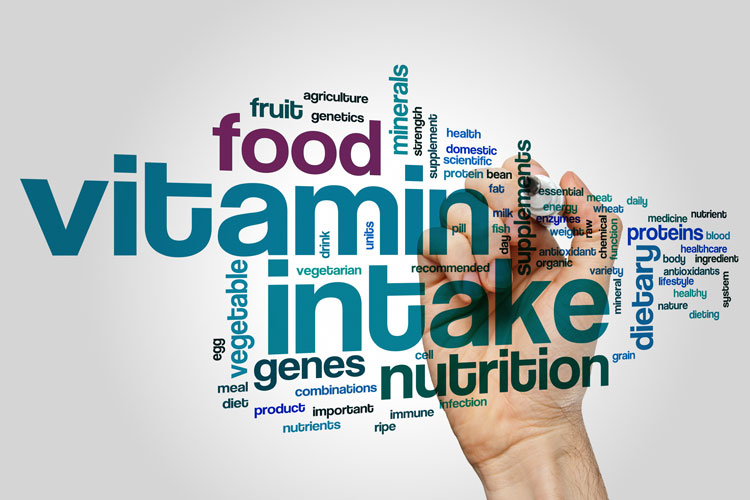Inspiring the food of tomorrow
- Like
- Digg
- Del
- Tumblr
- VKontakte
- Buffer
- Love This
- Odnoklassniki
- Meneame
- Blogger
- Amazon
- Yahoo Mail
- Gmail
- AOL
- Newsvine
- HackerNews
- Evernote
- MySpace
- Mail.ru
- Viadeo
- Line
- Comments
- Yummly
- SMS
- Viber
- Telegram
- Subscribe
- Skype
- Facebook Messenger
- Kakao
- LiveJournal
- Yammer
- Edgar
- Fintel
- Mix
- Instapaper
- Copy Link
Posted: 19 December 2018 | Sarah-Jane Reilly | No comments yet
Nutrigenomics is the scientific study of the genetic differences in human response to the bioactive compounds or nutrients in food. Dietitian Sarah-Jane Reilly outlines how research in this area is driving developments within the food industry,and considers how nutrigenomic foods might carve a path to consumers.


Nutrigenomics uses molecular tools such as proteomics, metabolomics and transcriptomics to identify how the components of a particular diet may affect the expression of genes in health and disease.1 It is often applied to human health through the concept of ‘personalised nutrition’ which provides individuals with targeted nutritional advice, products or services with the aim of improving or maintaining optimum health. This advice is typically based on the individual’s genetic, phenotypic and medical information.2 Commercial interest in nutrigenomics in recent years has led to the popularity of companies such as DNAFit, Habitat and EasyDNA among consumers. These companies offer personalised dietary advice based on the results of nutrigenetic home-based testing kits. Alongside the commercial developments and consumer interest in nutrigenomics, there has been an increased move towards the production of ‘functional foods’ within the food industry. These foods aim to deliver additional nutritional value to foods, with common examples including margarines with added plant sterols and stanol esters, and yoghurts containing probiotics.3,4 As more and more gene-diet interactions are identified everyday through candidate gene studies and genome-wide association studies, the question remains how personalised nutrigenomic foods can be developed and incorporated into the functional foods market. This article will explore some of the challenges encountered in the introduction of these foods and will identify current progress in the field of personalised nutrigenomic food development.
There is a strong mandate from consumers to support the introduction of personalised nutrigenomic foods for optimal health. This is reflected in the recent report from NewNutrition Business, whereby fragmentation and personalisation were cited as one of the 10 key trends in Food, Nutrition and Health for 2019.5 Some of the key market drivers for the personalisation of food products appear to be changing population demographics, increased consumer awareness of the relationship between diet and genotype and increased clinical evidence supporting the efficacy of functional foods.6 The current public health approach to ensuring that the population reaches the reference nutrient intake (RNI) of each essential nutrient is to overdose everyone on the scientific basis that most individuals can self-regulate each essential nutrient across a wide range of nutritional intakes.6 However, a major limitation of this ‘one size fits all’ approach is that it does not consider individual genetic polymorphisms that may increase or modify nutrient needs, or other factors such as overall food choice, drug-nutrient interactions, or medical conditions that may adversely affect nutrient utilisation.
The most compelling evidence to date that supports the inter-individual variance in nutrient requirements is in the metabolism of folic acid among carriers of the methylene tetrahydrofolate reductase (MTHFR) gene mutations – MTHFR C677T and MTHFR A1298C. In order to achieve the correct MTHFR levels for sufficient homocysteine metabolism, carriers of MTHFR gene mutations require a higher dietary intake of folate.7 Insufficient intakes of folate among carriers of these mutations have been associated with an increased risk of phenotypic outcomes such as heart disease, cancer and an increased incidence of neural tube defects.8-10 Folate supplementation in genetically-susceptible individuals with MTHFR mutations has been shown to reduce the incidence of these adverse health problems.
Similarly, research into folic acid supplementation has sparked interest in the potential role of L-methylfolate in the regulation of mood and the improved response mechanism to antidepressants.11 L-methylfolate is the only form of folate or folic acid that can actively cross the blood-brain barrier and assist with the production of serotonin, norepinephrine and dopamine.12 Nutraceutical companies have taken note of the evidence in relation to L-methylfolate and mental health. Products such as MethylPro, Deplin and XaQuil XR have now been developed as nutraceuticals to support this growing evidence base.
In relation to the microbiome, it is now well established that individual variations in gut microbiota are significant. However, the concept that microbiota or their direct products can be beneficial to the diet beyond providing specific vitamins has, to date, been largely understudied. Many scientists believe that by modulating gut microbiota, personalised nutrition can be achieved. It is known that gut microbiota and their by-products have the potential to alter the host metabolome, genome, transcriptome and proteome.13 However, despite scientific advances in this field, it is currently unclear how different components of diet influence the selective growth of certain microbial populations over others, to give rise to advantageous metabolic consequences.6 As a result of this, the food industry has focused largely on the provision of functional foods containing live cultures of beneficial bacteria in the form of probiotics. However, the potential role of prebiotics in human health should not be disregarded. For example, it has been found that oligosaccharides found in human milk can selectively stimulate the growth of the beneficial gut bacteria Bifidobacterium longum subsp. Infantis.14 Similarly, when studied in vitro, the prebiotic panose was found to reduce the growth of Clostridium, a class of Gram-positive bacteria associated with numerous human pathogens.15 By identifying microbial-food interactions, there is a potential for food companies to develop new metabolically-targeted foods aimed at optimising human health.
To date, the majority of food companies have focused on developing probiotic drinks and shakes. However, in recent years there has been a move towards developing more personalised probiotic foods. Companies such as uBiome, Rhythm Health and Microba have developed home-based microbiome testing kits, with many of them offering specific probiotic products based on the individual findings of these test results.
One of the main challenges associated with studying gene-diet interactions is that, unlike pharmacogenetics, food consumption cannot be linked with ‘single exposure – single time point’ effects.6 An individual’s diet is highly variable and composed of a mix of nutrients and other bioactive compounds that can interact with one another, making it difficult to identify which nutrient is influencing gene expression. Similarly, the contribution of single nucleotide polymorphisms (SNPs) to total disease risk can be dependent on the presence of other gene variants as there is a potential for epistatic interactions between genes to occur. Another key challenge associated with the introduction of nutrigenomic foods to the market place centres around ethical, legal and social issues (ELSIs). The current ‘biohype’ around nutrigenomic food has made international experts in the field of nutrigenomics raise questions about:
- the health claim benefits that may be used to market nutrigenomic products
- the management of confidential nutrigenomic information by commercial companies
- the delivery of nutrigenomic services
- the innovation of nutrigenomic products
- the potential for nutrigenomic products to introduce further health inequalities to society given the cost associated with their use.16
Additionally, the introduction of functional foods to the marketplace has the potential to blur the lines between food and drugs. Like drugs, nutrigenomic foods will need to be tested, not just for safety but also for efficacy. With this ambiguity comes the need for more transparent legislation and regulation of these foods. At present, the only guidance in this area within the European Union, comes from the European Nutrigenomics Organisation (NuGO) guidelines on bioethics for nutrigenomic researchers.17 The introduction of future regulation of these products is fundamental to the success of personalised nutrigenomic products. However, it is worth noting that with scientific regulation comes increased consumer confidence, but also additional food production challenges.
At present, it is unclear what the nutrigenomic foods of tomorrow will look like. There has been speculation that nutrigenomic food products will be developed that are tailored to the specific nutritional needs of the individual. However, given that nutrigenomics is an emerging area of science and diet-gene interactions are not yet fully understood, this seems somewhat premature. A more realistic prediction of what the food outcomes of nutrigenomic research will be include food products that identify food components that are beneficial to individuals who are genetically pre-disposed to medical conditions. In order to identify these genetic pre-dispositions, food companies may need to diversify their businesses and provide both nutrigenetic testing and specific product recommendations based on the results of these tests.
Alternatively, there may be an increased move towards the promotion of ‘personalised diets’ online via nutrigenomic advisory platforms. However, it is important to remember that commercial diet plans that are restrictive and offer no food choice in a bid to satisfy individual nutrient requirements are unlikely to be successful if they decrease the consumer’s overall enjoyment of food. At present, there are a number of food companies that offer ‘personalised’ dietary advice through online platforms, with future plans to incorporate nutrigenomics into their business model as the evidence surrounding the principles of nutrigenomics unfolds. One such example is Verdify Foods, a company that provides users with personalised recipes produced to dieticians’ guidelines and based on client food preferences, allergies, intolerances and medical co-morbidities. Client supervision by a dietician is another option.
Overall, there is significant interest in the field of nutrigenomics, both from researchers and consumers. This interest has facilitated international conferences on the subject of innovating nutrigenomic products. Most recently, the September NEWTRITIONX summit in Lubeck, Germany was dedicated solely to the topic of personalised nutrition, highlighting the growing trend towards personalisation, both in healthcare and the food industry. Food companies have yet to produce nutrigenomic products tailored to individual nutritional needs. However, large-scale food companies such as Nestle, Unilever and Danone are believed to be actively researching food solutions in this area. The food industry’s commitment to developing personalised nutrigenomic food products is reflected in the ongoing nutrigenomic research that is published on the Nestle Nutrition Institute pages.18 Nutrigenomics is a promising area for future food product development. However, its success is likely to be based on the successful integration of science with ethical food manufacturing principles.
Says Dr Lindsey Masson, Lecture in Nutrition at Robert Gordon University, Aberdeen, Scotland, “At present, it is premature to recommend personalised food products based on genotype as we do not have a sufficient evidence base to support the design of such products. For chronic diseases such as cancer and heart disease, there are many genes involved in various pathways, and we simply do not know enough about the multiple possible gene-diet and gene-gene interactions to start tailoring diets based on our genes.”
“Future studies need to be designed with very large sample sizes, with carefully controlled dietary interventions, and that investigate the effects of mutations in multiple genes rather than in single genes.”
In conclusion, there is not enough scientific evidence to support the widespread introduction of nutrigenomic foods aimed at meeting individual nutrient requirements. However, there is a potential emerging market for the personalisation of food products within the functional foods category, particularly in the development of nutraceuticals and probiotics.
About the author
Sarah-Jane Reilly is a registered dietitian with a first-class honours degree from Robert Gordon University, Aberdeen. Her research interests include health informatics, public health nutrition and nutrigenetics.
References
- Sales NMR, Pelegrini PB, Goersch MC. 2014. Nutrigenomics: Definitions and Advances of This New Science. Journal of Nutrition and Metabolism, doi: 10.1155/2014/202759.
- Ordovas J, et al. 2018. Personalised nutrition and health. British Medical Journal, doi: 361:bmj.k2173
- British Nutrition Foundation, 2018. Functional foods [online]. Available from: https://www.nutrition.org.uk/nutritionscience/foodfacts/functional-foods.html [Accessed 04 November 2018].
- EUFIC, 2018. Functional foods [online]. Available from: https://www.eufic.org/en/food-production/article/functional-foods [Accessed 04 November 2018].
- Newnutrition Business, 2018. 10 Key Trends in Food, Nutrition & Health 2019 [online]. Available from: https://www.new-nutrition.com/keytrend?id=90 [Accessed 04 November 2018].
- German BJ, et al. 2011. Nutrigenomics and personalised diets: what will they mean for food? Annual Review of Food Science and Technology, 2, pp. 97-123.
- Van der Put NM, et al. 1998. A second common mutation in the methylenetetrahydrofolate reductase gene: An additional risk factor for neural tube defects? American Journal of Human Genetics, 62, pp. 1044-1051.
- Gohil R, Peck G, Sharma P. 2009. The genetics of venous thromboembolism. A meta-analysis involving ~ 120,000 cases and 180,000 controls. Journal of Thrombosis and Haemostasis, 102, pp. 360-370.
- Galvan-Portillo M, et al. 2009. Dietary folate and vitamin B12 intake before diagnosis decreases gastric cancer mortality risk among susceptible MTHFR 677TT carriers. Journal of Nutrition, 26, pp. 201-208.
- Yaliwal LV, Desai RM. 2012. Methylenetetrahydrofolate reductase mutations, a genetic cause for familial recurrent neural tube defects. Indian Journal of Human Genetics, 18(1), pp. 122-124.
- Stahl SM. 2007. Novel therapeutics for depression: l-methylfolate as a trimonoamine modulator and antidepressant-augmenting agent. CNS Spectrums, 12(10), pp. 739-744.
- Shelton R, et al. 2013. Assessing Effects of l-Methylfolate in Depression Management: Results of a Real-World Patient Experience Trial. Primary Care Companion CNS Disorders, 15(4).
- Lewis KD, Burton-Freeman BM. 2010. The role of innovation and technology in meeting individual nutritional needs. Journal of Nutrition, 140, pp.26-36.
- Sela D, et al. 2008. The genome sequence of Bifidobacterium longum subsp. Infantis reveals,adaptations for milk utilisation within the infant microbiome. Proceeding of the National Academy of Science USA, 105, pp. 18964-18969.
- Makelainen H, et al. 2009. Panose, a new prebiotic candidate. Letters in Applied Microbiology, 49, pp. 666-672.
- Oliver D. ed., 2005. The future of nutrigenomics. From the lab to the dining room. California: Institute for the Future.
- EUROPEAN COMMISSION, 2007. EU project publishes bioethics guidelines for nutrigenomics research [online]. Available from: https://cordis.europa.eu/news/rcn/28093_en.html [Accessed 04 November 2018].
- NESTLE NUTRITION INSTITUTE, 2018. Nutrigenetics [online]. Available from: https://www.nestlenutrition-institute.org/resources/publication-series/publications/article/nutrigenetics [Accessed 04 November 2018].
Issue
Related topics
Health & Nutrition, New product development (NPD), Nutraceuticals, Research & development, Technology & Innovation
Related organisations
Danone, European Nutrigenomics Organisation (NuGO), Nestlé, Nestle Nutrition Institute, Robert Gordon University, Unilever, Verdify Foods








